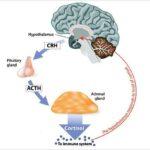Why a Kiss Feels Good
A kiss feels delightful primarily because it stimulates a multitude of nerve endings in our lips and mouth. Our lips are filled with sensory receptors that are highly sensitive to touch. As our lips touch another’s, these receptors relay signals to our brain, which are interpreted as pleasurable sensations.
However, the delight of a kiss isn’t solely due to its physical aspect. Our brains are programmed to unleash a mix of chemicals and hormones that amplify the pleasure of a kiss. Dopamine, the “feel-good” neurotransmitter, is one such chemical. It’s linked to sensations of pleasure, reward, and motivation, and its surge during a kiss can induce feelings of bliss and joy.
In addition to dopamine, kissing also triggers the release of oxytocin, often called the “love hormone.” Oxytocin is associated with bonding and attachment; its release during a kiss can deepen feelings of intimacy and connection between partners. This hormone has also been found to reduce stress and anxiety, further contributing to the positive feelings associated with kissing.
Furthermore, kissing stimulates our sense of taste and smell, adding another layer of sensory pleasure. Our mouths contain taste buds that can detect the flavors and textures of our partner’s lips, creating a unique and intimate sensory experience. Additionally, our sense of smell significantly influences how we perceive a kiss. The scent of our partner’s breath and skin can evoke strong emotions and memories, further intensifying our pleasure.
However, it’s important to note that the enjoyment of a kiss can vary from person to person. Personal preferences, cultural influences, and past experiences can shape our perceptions of kissing. What feels suitable for one person may not necessarily feel the same for another.
In conclusion, a kiss feels so good because it engages our senses, triggers the release of pleasurable chemicals in our brains, and fosters a more profound understanding of connection and intimacy. It is a powerful expression of love and desire that can evoke many emotions. So, next time you find yourself in a passionate embrace, take a moment to appreciate the science behind the pleasure and enjoy the magical experience of a kiss.
The Chemicals Behind the Pleasure
One of the critical chemicals released during a kiss is dopamine. Dopamine is often referred to as the “feel-good” neurotransmitter because it is associated with pleasure and reward. When we kiss someone we are attracted to, dopamine levels increase, leading to euphoria and happiness; this surge of dopamine can also create a sense of craving and addiction, explaining why kissing can be so addictive and why we often want to kiss our partner again and again.
In addition to dopamine, kissing triggers the release of oxytocin, often called the “love hormone.” Oxytocin is associated with bonding and intimacy and plays a crucial role in forming emotional connections between individuals. When we kiss someone we love or feel a deep connection, oxytocin levels rise, promoting trust, closeness, and attachment. This hormone is essential in romantic relationships, as it helps to strengthen the bond between partners.
Furthermore, kissing can also increase endorphins, which are natural painkillers and mood boosters. Endorphins are released during physical activity, and kissing can be seen as an exercise for the lips and facial muscles. This release of endorphins can help reduce stress, alleviate pain, and improve overall well-being.
Interestingly, kissing can also impact our immune system. When we kiss, we exchange saliva, which contains antibodies that can help strengthen our immune response. This exchange of bacteria and viruses during a kiss can actually help build up our immune system, making us more resistant to common illnesses.
Overall, the science behind a kiss is fascinating. It is not just a simple act of pressing lips together but a complex interplay of chemicals, hormones, and physiological responses. Kissing can evoke intense emotions, strengthen bonds, and improve our health. So next time you share a passionate kiss with someone special, remember there is much more going on than meets the eye.
The Sensory Experience of a Kiss
Sound: In addition to touch, taste, and smell, the sensory experience of a kiss also involves sound. The soft, gentle smacking sound made when lips meet can create a sense of intimacy and closeness. It can be a comforting and reassuring sound, signaling affection and connection between two individuals.
Sight: The visual aspect of a kiss cannot be overlooked. The sight of two people coming together, their lips meeting in a tender embrace, can be incredibly captivating and beautiful. It is a visual representation of love, passion, and desire. The sight of a kiss can evoke emotions and stir the senses, heightening the overall sensory experience.
Temperature: The temperature of a kiss can also play a role in the sensory experience. When lips touch, there is a transfer of warmth and heat, creating a comforting and pleasurable sensation. The contrast between the coolness of the air and the warmth of the kiss can add an exciting element to the experience, intensifying the sensory pleasure.
Emotions: A kiss is also an emotional experience beyond the physical sensations. It is a way to express love, desire, and affection. The feelings associated with a kiss can enhance the sensory experience, making it more meaningful and memorable. The rush of emotions accompanying a kiss can heighten the pleasure and create a deep connection between two people.
In conclusion, a kiss is a simple physical act and a multi-sensory experience that engages touch, taste, smell, sound, sight, temperature, and emotions. It is a powerful and intimate gesture that can evoke various sensations and emotions, creating a truly unforgettable experience.
Differences Between Men and Women in Kissing
Biological Factors: One possible explanation for these differences is the biological factors influencing men and women. Hormonal variations, such as testosterone and estrogen levels, can shape their responses to a kiss. Testosterone, which is generally higher in men, is associated with sexual desire and aggression, which may explain why men are more focused on the physical sensations of a kiss. On the other hand, estrogen, which is more prevalent in women, is linked to emotional bonding and nurturing behaviors, which may explain why women emphasize the emotional connection in a kiss.
Social and Cultural Influences: In addition to biological factors, social and cultural influences also contribute to the differences between men and women regarding kissing. Society often imposes certain expectations and norms on gender roles and behavior. For example, men are usually encouraged to be more sexually assertive and dominant, while women are expected to be more nurturing and emotionally expressive. These societal expectations can shape how men and women approach and perceive kissing. Men may feel pressure to initiate sexual activity through kissing, while women may feel the need to establish emotional intimacy through kissing.
Personal Experiences and Preferences: It is important to note that not all men and women fit into these generalizations. Personal experiences, upbringing, and individual preferences can significantly influence how someone perceives and engages in kissing. Some men may prioritize emotional connection over physical sensations, while some women may prioritize physical pleasure over emotional bonding. Recognizing and respecting these individual differences is crucial when understanding men’s and women’s diverse perspectives and experiences about kissing.
Overall, while men and women share many similarities in their physiological and emotional responses to a kiss, nuanced differences can be attributed to biological factors, social and cultural influences, and personal experiences. Recognizing and understanding these differences can lead to more meaningful and satisfying intimate connections between individuals.




